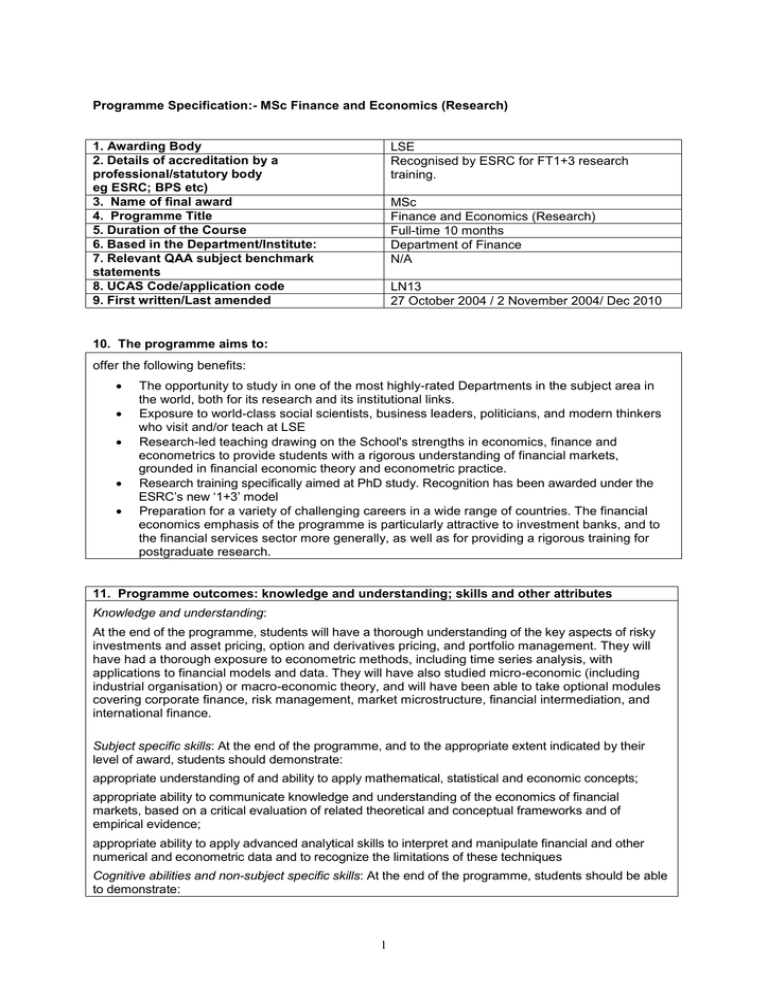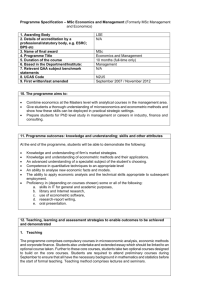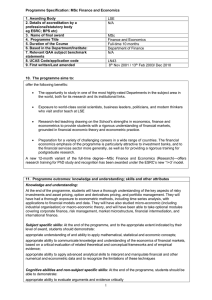LSE Programme Specification:- MSc Finance and Economics (Research) 1. Awarding Body
advertisement

Programme Specification:- MSc Finance and Economics (Research) 1. Awarding Body 2. Details of accreditation by a professional/statutory body eg ESRC; BPS etc) 3. Name of final award 4. Programme Title 5. Duration of the Course 6. Based in the Department/Institute: 7. Relevant QAA subject benchmark statements 8. UCAS Code/application code 9. First written/Last amended LSE Recognised by ESRC for FT1+3 research training. MSc Finance and Economics (Research) Full-time 10 months Department of Finance N/A LN13 27 October 2004 / 2 November 2004/ Dec 2010 10. The programme aims to: offer the following benefits: The opportunity to study in one of the most highly-rated Departments in the subject area in the world, both for its research and its institutional links. Exposure to world-class social scientists, business leaders, politicians, and modern thinkers who visit and/or teach at LSE Research-led teaching drawing on the School's strengths in economics, finance and econometrics to provide students with a rigorous understanding of financial markets, grounded in financial economic theory and econometric practice. Research training specifically aimed at PhD study. Recognition has been awarded under the ESRC’s new ‘1+3’ model Preparation for a variety of challenging careers in a wide range of countries. The financial economics emphasis of the programme is particularly attractive to investment banks, and to the financial services sector more generally, as well as for providing a rigorous training for postgraduate research. 11. Programme outcomes: knowledge and understanding; skills and other attributes Knowledge and understanding: At the end of the programme, students will have a thorough understanding of the key aspects of risky investments and asset pricing, option and derivatives pricing, and portfolio management. They will have had a thorough exposure to econometric methods, including time series analysis, with applications to financial models and data. They will have also studied micro-economic (including industrial organisation) or macro-economic theory, and will have been able to take optional modules covering corporate finance, risk management, market microstructure, financial intermediation, and international finance. Subject specific skills: At the end of the programme, and to the appropriate extent indicated by their level of award, students should demonstrate: appropriate understanding of and ability to apply mathematical, statistical and economic concepts; appropriate ability to communicate knowledge and understanding of the economics of financial markets, based on a critical evaluation of related theoretical and conceptual frameworks and of empirical evidence; appropriate ability to apply advanced analytical skills to interpret and manipulate financial and other numerical and econometric data and to recognize the limitations of these techniques Cognitive abilities and non-subject specific skills: At the end of the programme, students should be able to demonstrate: 1 appropriate ability to evaluate arguments and evidence critically appropriate ability to locate, extract, analyse, and draw reasoned conclusions from multiple sources— including electronic sources—of appropriate literature and relevant data appropriate ability to acknowledge and reference sources appropriate capacities for independent and self-managed learning appropriate use of communications and information technology, such as spreadsheets, wordprocessing and on-line databases appropriate communication skills such as ability to present quantitative and qualitative information, together with analysis, argument and commentary, in an appropriate form ability to work in groups and other appropriate inter-personal skills, including oral and written presentation skills Information relating to careers can be accessed here 12. Teaching, learning and assessment strategies to enable outcomes to be achieved and demonstrated Teaching and learning strategies: This programme provides research-led teaching which aims to bring students to the forefront of practice and theory in their selected areas of specialisation. The teaching is of an advanced nature and covers internationally significant conceptual and technical developments in finance, financial economics and econometrics. Students acquire their detailed knowledge and understanding of the course, and their subject specific skills, through a combination of lectures, problem classes and progression to guided independent study, reinforced by the opportunity to meet teachers and their supervisors one-to-one in office hours. Course reading lists include not only leading textbooks but references to current research literature and primary sources, including relevant examples from current practice, official and professional policy documents, websites and other electronic data sources. The work for the compulsory dissertation (equivalent to a half-unit) may take the form of: (1) (a) analysing the relevant publications and other source material on a particular topic; and (b) writing a critical survey cum commentary, indicating clearly the main issues and the limitations; or (2) investigating and reporting on a selected problem, either by some small-scale empirical research, or by using information derived from secondary sources. The report must show ability to separate the important from the less important, to sustain reasoned argument and draw conclusions, and to arrange the whole in an organised manner. The report must be presented in word-processed format. Academic teaching staff are leading-edge researchers who give students an insight into current thinking and recent developments in their fields. Several teachers and supervisors are also involved in policy advice and formation and give students insights into real-world developments in finance, economics and econometrics and the forces that shape them. Students have the opportunity to acquire hands-on experience of CIT as well as familiarity with electronic data sources and databases. Assessment strategies: Summative assessment of knowledge and understanding and of subject-specific skills is primarily by 3hr unseen examinations at the end of each year, together with the dissertation. For some options coursework project assessment amounts to 25%-30% of the final course grade. Formative assessment is through class assignments, including numerical and computer-based 2 exercises, critical essays and commentaries, and individual and group presentations, for example on case studies and mini-projects or on professional publications. Cognitive and non-subject specific skills are developed in parallel with the development of—and through the same teaching and assessment structures that are designed to achieve the appropriate levels of—the knowledge and understanding and subject specific skills described above. 13. Programme structures and requirements, levels, modules and awards. Before the session starts students are required to take and pass a two week pre-sessional course in mathematics, jointly with MSc Economics students, as well as an introductory course in stochastic processes and calculus. Thereafter students take examined courses up to a total of three and a half units, and write a dissertation of 6,000-10,000 words on an agreed topic in one optional half-unit course. See the full MSc Finance and Economics (Research) programme regulations Additional Information 14. Criteria for admission to the programme Entrants must be numerate and have at least a good upper second class honours degree, preferably in economics, from a UK university or have reached a similar standard in an overseas degree, having taken courses in economic theory, econometrics, and preferably finance. A GRE or GMAT test score, with strong performance in the quantitative segment (above the 85th percentile) is required. (See the introductory section in the LSE Graduate Prospectus on GMAT/GRE.) Non-English speakers also have to meet the School’s standard requirement for English language for all graduate programmes - IELTS 6.5, TOEFL 603 in the paper test, 263 in the computerbased test. 15. Indicators of quality Applications for places: 1400 applications for 80 places in 2010 for MSc Finance and Economics – only the best 5-8 students then transfer into the Research programme. RAE rating (2001): Accounting and Finance: 5*A / Economics: 5*A Finance Faculty lead and are associated with major ESRC funded research centre, the Financial Markets Group (FMG) The last APRC review of the Department of Accounting and Finance was in 2003/04 The last TLAC review of the Department of Finance was in March 2009 The Department is recognised as an FT+3 research training outlet by the ESRC. The degree has received FT1+3 recognition from the ESRC The LSE Careers Centre website provides data on career destinations of LSE graduates. 16. Methods for evaluating and improving the quality and standard of teaching and learning 3 School mechanisms (*operate at departmental level): * regular staff appraisal* * induction and mentoring* system * student satisfaction survey by TQARO * external examiner check-up system by TLAC * review of all new courses and programmes, and major modifications, by GSSC * full departmental TLAC review every 5 years The Department’s additional quality evaluation procedures are coordinated through its Teaching Quality Enhancement Panel. Primary responsibility lies with individual course leaders, course lecturers, class teachers, and supervisors and their own self-evaluation is focussed primarily through the Department’s annual course reviews and peer-teaching observations, the TQARO student questionnaires and the School’s mentoring and staff appraisal processes. Other Departmental structures and processes include: the annual Examination Sub-Board meeting constituted for this degree and the appointed External Examiner’s reports. the termly Departmental meeting the responsibilities of the Programme Director and the programme steering committee, student feedback and consultation through the MSc staff-student liaison committee (SSLC) constituted for this degree ad hoc reviews 4

